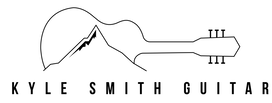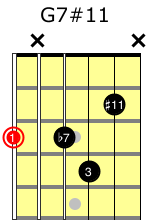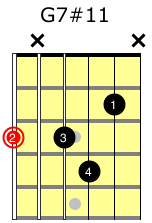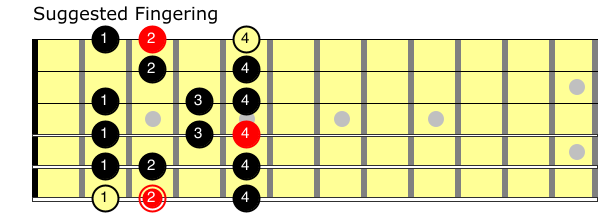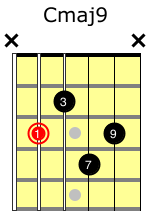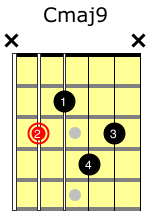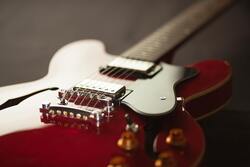 Whether you're playing blues, rock, country, hip hop, or jazz - the minor pentatonic scale is going to be a helpful tool for you to have at your disposal. This is a foundational pattern that appears in many styles of music from around the world, and opens the door for learning new techniques and improving your guitar playing skills. In minor keys, the minor pentatonic scale is going to be your best bet for improvisation most of the time - at least as a starting point.
For many styles of music, these patterns make up 80-90% of the material you need for playing solos. Once you have your pentatonic shapes down cold, they will also give you a framework you can use to easily learn your other minor scales on top of.
0 Comments
 Adding an extra note on the 2nd string is a good way to add some color to your fundamental jazz guitar chords. For our purposes, we are going to call these notes color tones While the fundamental chords give you a really clean representation of the jazz chord, adding color tones gives you more control over the sound, more ability to play specific chords that pop up in your music, and make playing chords a lot more fun.  Major seventh arpeggios are an essential skill for playing jazz guitar, and they can be a lot of fun to work on, too. These arpeggios will let you outline a major 7th chord when you are improvising over jazz standards or jazz ensemble music. By practicing these arpeggios, you'll be teaching your fret hand to find good notes to land on when improvising over a major 7th chord. 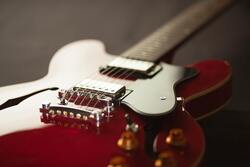 The major pentatonic scales are an important building block for playing melodies and improvising solos on the guitar. These patterns are important for all styles of music, and especially helpful when you’re learning to play jazz guitar. These scales can be a helpful go-to source for material when you are improvising on a major blues progression, or with other progressions that stick mostly to a major key. To get the most out of this lesson, you’ll want to know the notes along each of the guitar strings. If you’re not comfortable with that yet, click here to get started. If you’re in a hurry to get these scales under your fingers and playable, don’t worry! I’ll include a fretboard map here to show you what you need to know. The pentatonic scales are helpful for a couple of reasons:
 Like anything worth doing, learning to play guitar takes time. Whether you’re in guitar lessons or learning on your own, there is no such thing as a shortcut. But this should be seen as good news! Playing guitar is a lot of fun even at the beginning stages. If you enjoy the process, there is no need to try to speed things up. That being said, it can be tempting to look around and decide that you are somehow behind. Whether you’re looking at friends who have been playing longer than you, or watching the 9 year old shredding the blues on youtube, there is always something out there to make us want to take our playing further. One mistake I see is when people try to “catch up” by working on several things at once and trying to multitask in their guitar practice. The idea that you can just do more and speed up your progress is tempting to buy into - but unless you have several hours a day to practice (and the attention span/stamina to match), it just doesn’t work out that way. The best way for you to make progress in your guitar playing is to be patient, and work on one thing at a time. 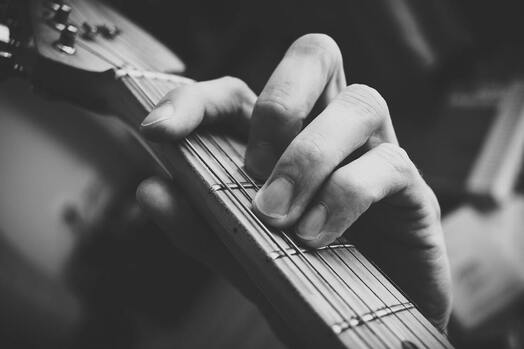 Consistent practice (picking up the guitar most days) is your fastest path to improving your guitar playing. While this may sound like a no-brainer, many guitar players and students I come across don’t follow this simple idea. It’s easy to let life get in the way, especially when you have a busy schedule and don’t feel like you have time to practice. When you let too many days go by between practice sessions, you’ll start to get rusty - even if you practice for long sessions on days that you do play your guitar. This is typical even with more serious students at the college level. They will tend to practice a lot just before an impending deadline - whether it’s a lesson day, or a performance - and then put the guitar down for a couple of days until the next deadline pops up. With a little effort you can build a habit of playing your guitar on more days than you don’t - and keep your guitar skills moving in the right direction. The more often you pick up your guitar to practice, the faster you’ll improve (and it will be much less stressful to get ready for your big performances)! The whole reason we learn scales and patterns is that they are used in songs and riffs that we hear every day.
By learning your scales and being able to use them musically, you can make it easier for you to learn riffs or melodies that you want to learn. Let’s look at the riff from Born Of A Broken Man by Rage Against The Machine: This is a helpful jazz guitar voicing for a G7#11 chord. This is a movable voicing with the root on the 6th string, meaning that you can change the letter name of this chord by moving it up or down the neck. Note: The #11 can also be called a b5. You might see G7#11 or G7b5 on a chord chart, but this chord shape covers either name. On the left is the G7#11 chord shown with the chord tones/intervals used, and on the right is the recommended finger pattern. This chord can be used for any dominant 7th (G7, C7, etc) type chord you come across.
Whether it calls for G7, G9, or anything else with a 7 or higher in the chord symbol, this chord will work. This is an important scale pattern for improvising and playing melodies to jazz standards. Many melodies use the major scale in some way shape or form as a foundation. While melodies will likely have notes that don’t fit this pattern exactly, it can serve as a template to keep yourself organized when you play. Playing ExampleThis is a helpful jazz guitar voicing for a Major 9th chord. This is a movable voicing with the root on the 5th string, meaning that you can change the letter name of this chord by moving it up or down the neck. On the left is the Cmaj9 chord shown with the chord tones/intervals used, and on the right is the recommended finger pattern. This chord can be used for any major 7th type chord you come across. Whether it calls for Cmaj7, Cmaj9, or anything else with a “maj” in the chord symbol, this chord will work.
|
